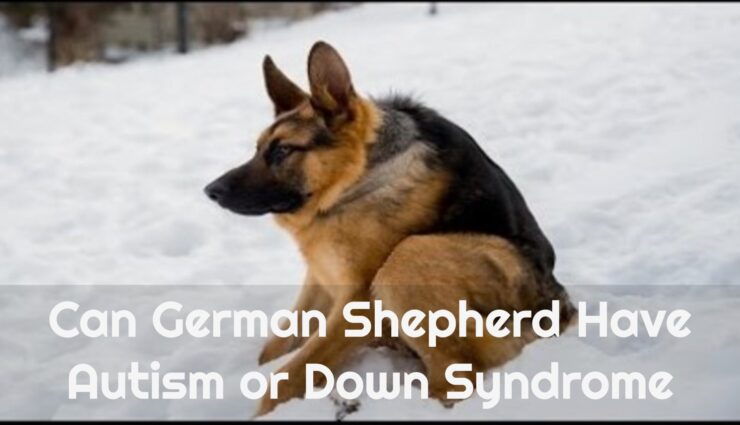There are various health-related conditions which influence the overall well-being of humans and dogs, for example, diabetes, anxiety, cancer and many more. German shepherds are an intelligent breed of dog. Hip dysplasias, Epilepsy, Degenerative disc disease, Hemophilia are some common health conditions which occur in GSD. Usually, GS keepers ask questions like about the frequency of occurrence of Autism and Down syndrome and their major causes along with better management.
Here, we will discuss in detail about the occurrence of Autism and Down syndrome in GSD and their effective treatment and management
WHAT IS DOWN SYNDROME?
Down syndrome is basically a health condition of genetic nature that occurs due to abnormal/aberrant cell division that results in the partial or an extra full copy of chromosome 21.In simple words, down syndrome is also known as ‘Trisomy’.
According to the Centre for Disease Control and Prevention (CDC), there are various physical and mental changes occurring in the people suffering from the down syndrome such as short neck, small hands and feet, flattened face, hearing problems, heart defects, spotty iris and much more. These all signs and symptoms have been observed in people suffering from Down syndrome.
Genetic makeup of GS:
Down syndrome is majorly a genetic condition that affects human beings. But when it comes to GSD, this is hard to say whether GS experiences the same signs and symptoms as humans do or whether mental/developmental changes occur in dogs suffering from Down syndrome.
However, according to the experts, Down syndrome is a very rare health related event in German shepherds. The big logic behind is the difference between the genetic makeup of human beings and dogs.
Humans have 46 chromosomes (23 sets), on the other hand dogs have 78 chromosomes (39 pairs). This is why; any abnormality/duplication in 21 chromosomes will affect both species in a different manner.
Talking broadly, canine Down syndrome doesn’t actually exist but there are a number of genetic conditions reported in dogs which are similar to Down syndrome in human beings. Dogs suffering from those genetic abnormalities manifest signs and symptoms quite similar to Down syndrome.
Congenital hypothyroidism in GS:
This condition is characterized by the low levels of thyroid hormone at birth or early in life in GS.
The clinical picture of this particular congenital condition in GS is quite related to Down syndrome. The following signs and symptoms appear in dogs with this condition:
1) Large protruding tongue
2) Broad forehead
3) impairment in proper mental functioning
4) Abnormal gait and poor muscle tone
5) Delayed tooth eruption
6) Small stature
7) Delayed opening of eyes
Other conditions such as congenital hydrocephalus, growth hormone deficiency, pituitary dwarfism, Pixabay, congenital heart issues can also be easily confused with Down syndrome.
Recommendation: If you observe any of the above given signs in your dog, talk to your vet. He/she can help you in suggesting a better treatment plan after making a thorough and exact diagnosis. Moreover, provide your dog a well balanced and healthy diet, a comfortable/stress free environment and lots of attention. These all things can help your dog staying safe and sound.
WHAT IS AUTISM?
Autism or autism spectrum disease is characterized by problems with social, nonverbal communication, speech and other behaviors. This is another behavioral disorder of human origin. Although autism has been observed in GS but many experts prefer to call this particular condition “Canine dysfunctional behavior” instead of autism.
Note: This is important to know that both dogs and humans are born autistic. They don’t get autism after birth. However, many researchers have supported the concept of autism in dogs, but still there are some scientists oppose this idea.
Causes:
Autism is a multifactorial condition but the possible causes of this condition in GS shepherd can be the following ones:
1) Genetic – Inherited from parents
2) Poor development of certain areas of the brain or over development of certain brain circuits.
Note: Both the above given causes are congenital in nature.
Signs and symptoms of autism in GS:
There are a wide range of symptoms which can be observed in GS with autism or related behavioral disorders. The key signs have been enlisted below:
1) Repetitive behavior
GS can be seen with repeating certain behaviors such as teeth grinding, chewing etc.
2) Lacking social engagement
GS suffering from this condition will lack social interactions with owners and other animals. Remember, GS is a social and interactive dog, lacking this skill can be an indication of autism.
3) Dullness:
The GS will show laziness and lack of activity.
4) Behavioral issues:
Your dog may show aggression and abnormal patterns of behavior. This is important to note that autistic GS will not always show aggressive behavior but can show other weird behaviors such as avoiding people, staring at objects, lack of excitement etc.
Note: GS are also used to cure children suffering from autism—used in animal-assisted therapy.
Recommendations:
If you observe any above give signs in your GS, talk to your vet. Your vet can help you better to reach the actual cause. Additionally, provide safe and secure living environment to your dog, a well balanced quality diets and positive enrichment activities. Go for walk/exercise with your GS according to your schedule. All along with that, you can hire a trainer for your GS who can help your beloved canine friend with this autism and related issues. Remember, there is no defined medication that can cure a dog suffering from autism and related issues. But there are various tranquilizers which can be given to your dog to calm aggression. Use medications in proper dose and after consultation with a registered veterinary practitioner.
Conclusion:
Down syndrome and autism are two health-related conditions of human origin. Their possibility in GS is very rare .But there are a number of genetic health conditions in GS which mimic autism and Down syndrome. This is why, it is always recommended to keep an eye on your beloved GS and schedule routine veterinary checkups. Last but not least, there are certain differences between autism and down syndrome however, the clinical picture of both conditions can match with each other.
REFERENCES:
Bojanić, Krunoslav, Els Acke, and Boyd R. Jones. “Congenital hypothyroidism of dogs and cats: a review.” New Zealand veterinary journal 59.3 (2011): 115-122.
Chávez, Gonzalo A., and Álvaro J. Opazo. “Predatory aggression in a German shepherd dog.” Journal of Veterinary Behavior 7.6 (2012): 386-389.
Griffioen, Richard Eric, et al. “Changes in behavioural synchrony during dog‐assisted therapy for children with autism spectrum disorder and children with Down syndrome.” Journal of Applied Research in Intellectual Disabilities 33.3 (2020): 398-408.
Thomas, William B. “Hydrocephalus in dogs and cats.” Veterinary Clinics: Small Animal Practice 40, no. 1 (2010): 143-159.





